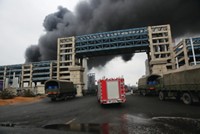Advertisement
Grab your lab coat. Let's get started
Welcome!
Welcome!
Create an account below to get 6 C&EN articles per month, receive newsletters and more - all free.
It seems this is your first time logging in online. Please enter the following information to continue.
As an ACS member you automatically get access to this site. All we need is few more details to create your reading experience.
Not you? Sign in with a different account.
Not you? Sign in with a different account.
ERROR 1
ERROR 1
ERROR 2
ERROR 2
ERROR 2
ERROR 2
ERROR 2
Password and Confirm password must match.
If you have an ACS member number, please enter it here so we can link this account to your membership. (optional)
ERROR 2
ACS values your privacy. By submitting your information, you are gaining access to C&EN and subscribing to our weekly newsletter. We use the information you provide to make your reading experience better, and we will never sell your data to third party members.
Business
Pollution In China
Residents oppose another p-xylene project
by Jean-François Tremblay
October 20, 2008
| A version of this story appeared in
Volume 86, Issue 42
Opposition to a plan to build a petrochemical complex equipped with an aromatics unit is mounting—in cyberspace so far—in Taizhou, an industrial city south of Shanghai. Taizhou is home to numerous chemical plants and already suffers from heavy pollution.
Although the project is still in the early stages of planning, city residents have posted numerous protests on electronic bulletin boards. Many of the messages on the most active site (bbs.taizhou.com) call on local government officials to extensively consult the public before construction starts.
Taizhou residents are particularly incensed that the multi-billion-dollar project will include a 2.4 million-metric-ton-per-year plant for p-xylene, a polyester raw material. Other components of the complex, according to the Chinese media, are an oil refinery and a 2.4 million-metric-ton ethylene unit. None of the three firms reported to be behind the project—PetroChina, its parent China National Oil Corp., and Shell—have confirmed their involvement.
This is the third project featuring a p-xylene unit to be challenged in China in the past two years over health and pollution concerns. In coastal Xiamen, middle-class protesters stopped the planned construction of a p-xylene unit near the city center last year (C&EN, June 11, 2007, page 17). And in March, violent protests against a p-xylene unit took place in Fujian province (C&EN, March 10, page 15).
Kenji Otsuka, an expert in Chinese rural development at the Institute of Developing Economies, in Chiba, Japan, figures that Taizhou officials remain optimistic about the project's success. But from what has happened in other parts of China, he says, the project could be abandoned if online protests turn into real ones.



Join the conversation
Contact the reporter
Submit a Letter to the Editor for publication
Engage with us on Twitter